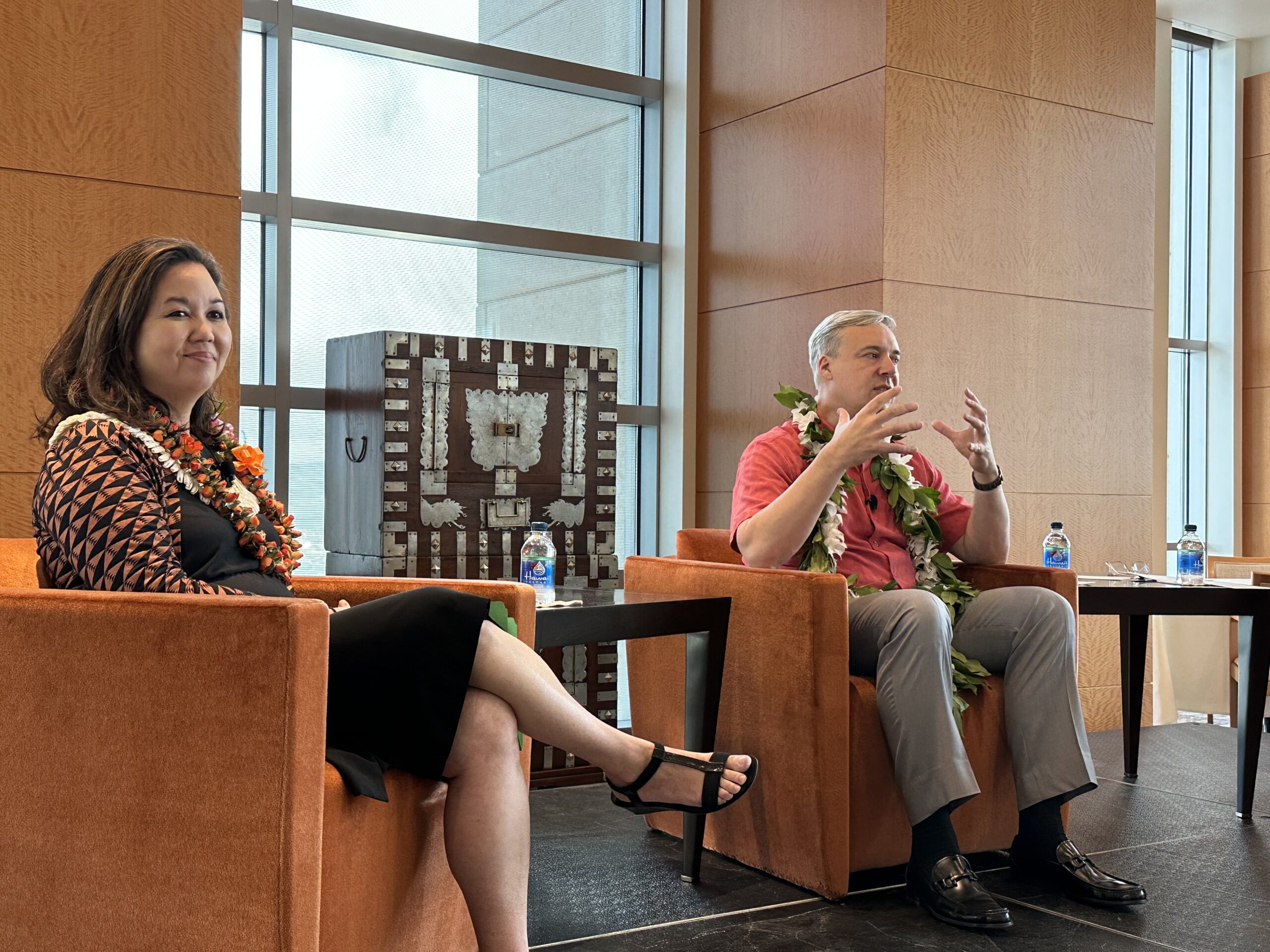‘Ramping It Up On Steroids:’ Defense Contractor Wants A Bigger Role In Hawaii’s Economy
By Stewart Yerton | Honolulu Civil Beat
February 20, 2023
As an astrophysics student at the University of Hawaii Manoa, Kaimi Kahihikolo learned to analyze what he calls “some of the most complex datasets in the universe.” Now, Kahihikolo is applying his skills for national defense.
A graduate of Kamehameha Schools, the budding scientist spent college summers as an intern at the International Gemini Observatory on Mauna Kea and at Princeton University, where he used math and computer coding skills to solve mind-boggling problems. Obvious places to go after earning a bachelor’s degree, he says, included tech companies like Google and Facebook. Instead, through a local programmer’s club, he learned about Booz Allen Hamilton, a management consulting and technology firm with a big footprint in the defense and military intelligence sectors.
“I learned that I don’t have to leave Hawaii,” said Kahikikolo, who works with Booz Allen’s Chief Technology Office on projects involving artificial intelligence and natural language programming. “My only options weren’t the Googles and the Metas out there.”

Horacio Rozanski, Booz Allen’s president and chief executive, couldn’t say how many more people it plans to hire or the timetable for hiring them. But he said the company wants to be part of the community.
“This, in my mind, is a critically important market because China is a critically important issue for our country,” he said. “So there’s a ton of opportunity. I’m not sure that I can size it quite yet, but I can tell you that being here in a way that we can add more value to these missions is absolutely imperative for us.”
U.S. Rep. Jill Tokuda noted it’s nothing new to have military contractors in Hawaii. But she said what Booz Allen seems to be aiming for is different.
“I just love that we’re talking about ramping it up on steroids,” Tokuda said at a Booz Allen event last week.
Also on hand were Lt. Gov. Sylvia Luke, Honolulu Mayor Rick Blangiardi and Neil Abercrombie, a former governor and U.S. congressman.
The critical question is whether Hawaii can produce enough people like Kahihikolo to take advantage of opportunities from Booz Allen, projects dealing with cyber technology as well as systems connecting things like aerial platforms, weapon systems, and surveillance and communication. From an economic development perspective, the high-tech, high-paying jobs are there for the taking — if the community can simply prepare people to take them.
“It’s not just low-hanging fruit,” Tokuda said of the Booz Allen jobs. “It’s fruit they’re trying to feed us.”
Coming Out Of Its Shell
It’s hardly a secret that the military plays an enormous role in Hawaii’s economy. Accounting for 8.3% of all the goods and service produced, the military is the second-largest sector in Hawaii, according to the University of Hawaii Economic Research Organization. It spins off $2.6 billion annually in contracts alone.
Booz Allen’s role has been less prominent, but still big. Since 2008, the company has landed approximately $238 million in government contracts in Hawaii, virtually all related to the military or intelligence, according to the website USASpending.gov.
Still, when it came to publicity in Hawaii, the company kept a low-profile. Its most well-known local employee in recent years was Edward Snowden, a former Booz Allen employee who leaked classified information about the National Security Agency’s domestic spying program and other matters before fleeing to Russia, where he has become a naturalized citizen.
Now, as part of its effort to connect more with the local community, Booz Allen is emerging from its shell. The 30,000-employee company’s leadership team got together for an in-person roundtable talk with local media last week as part of a series of meetings with political and business leaders, as well as Hawaii clients.

“I think we all appreciate the geopolitical essence of Hawaii,” Jordan said during the media briefing. “It’s always been a very strategic imperative to have a presence, a strong presence, here. We all know the history going back to World War II, but we’re in a time now where not only is the facing threat China, you can almost look at the facing threat as being temporal, in time.”
The vast stretch of ocean between China and the U.S. mainland was once an advantage, a spatial barrier that would take time to cross, Jordan said.
But technology has changed that. In a most basic sense, things like Chinese hypersonic missiles have shrunk the temporal barrier, meaning less time to sense, plan and react. A cyber attack could happen even faster.
“Now is the time to acquire a capability, time to acquire the workforce, the time to acquire, really, the leverage that it takes to counter the things that we see as the real threats,” Jordan said. “And we know that the region is going to be really the pivot point.”
In Booz Allen’s world, it’s not simply about fighting the enemy with missiles, it’s about weaponizing data.
“You can even say data as a deterrent now becomes a real necessity — where we can sense, where we can detect, or we can employ and influence adversaries really through data,” Jordan said.
Promising Employees A Chance ‘To Change The World’
While Jordan speaks of the future, the company is already hiring. Booz Allen’s help wanted listings show 76 openings in Hawaii. They include a junior signals intelligence reporter located at Fort Shafter earning up to $93,000 annually, and a senior data scientist at Fort Shafter earning up to $212,000.
Booz Allen has more than money and benefits to offer candidates. The company has built out sleek office spaces at the First Hawaiian Center on Bishop Street full of high-tech toys and co-working spaces and meeting rooms with local art and decor with the vibe of a hip coffee house.
“Now is the time to acquire a capability, time to acquire the workforce.” — Rex Jordan of Booz Allen Hamilton
Booz Allen also touts its diversity. Women comprise more than half of its leadership team, including Kristine Martin Anderson, its chief operating officer; Judi Dotson, president of its global defense sector; and Susan Penfield, chief technology officer.
Globally, 36% of Booz Allen’s workforce identified as female, including 35% of senior management and 67% of executive leadership, according to a recent presentation for investors. In addition, 32% of its U.S. workforce identified as Black, Indigenous or people of color.
“We have a culture that is centered a very basic premise, which is that we empower people to change the world,” says Rozanski, a native of Argentina who joined Booz Allen as a college intern.
The company faces another challenge in Hawaii — strained relations between the military and the community. This dates back long before the recent series of failuresat the Navy’s World War II-era Red Hill fuel facility last year, when a leak contaminated the drinking water around Pearl Harbor, causing numerous health problems for families. Other points of conflict include protests over live fire combat simulations in Makua Valley and the use of the island of Kohoolawe as a bombing target.
Asked how to address concerns of young people who simply don’t want to be involved with the military-industrial complex, Jordan returned to one of Booz Allen’s key talking points: the company wants to be part of the community. As for opportunities beyond the Department of Defense, Jordan pointed to areas like cyber and data science.
“Are there opportunities beyond DOD?” he said. “In a big way, yes.”
Building A Pipeline
Abercrombie, who as U.S. Representative served on the House Armed Services Committee, said it looks like Booz Allen is preparing to “get ahead of the consultant curve” poised to grow in Hawaii. He said it makes sense for Booz Allen to be trying to expand here to tap into an expected flow of defense money. Whether the Pentagon spends the money wisely is another question.
“I’ve seen billions pissed away,” he said.
He agrees the key to creating a positive impact on the community is to grow a local workforce that can tap into the new jobs.
Carl Bonham, the director of UHERO, said growing a local pipeline of talent isn’t just good for Hawaii. It’s also necessary for Booz Allen.
“They have to if they’re going to grow their presence here,” Bonham said.
It’s not just that Hawaii’s high cost of living that makes it hard to recruit people, Bonham said. Those who do come often leave before long, he said, which increases expenses. The challenge is Hawaii can’t stand up an educational and worker training program overnight, said Len Higashi, executive director of the Hawaii Technology Development Corp., a government economic development agency.
“The key is jobs over time,” he said.
The HTDC is part of a public-private partnership called Good Jobs Hawaii, administered by the University of Hawaii Community Colleges with $35 million in funding. The goal is to provide training and job placement for up to 3,000 residents. Booz Allen is part of the initiative, Higashi said.
“They’re putting their money where their mouth is,” Higashi said.
In addition to a college internship program for local students, Booz Allen works with organizations such as Hawaii FIRST Robotics, a program to generate interest among young people in science, technology, engineering and mathematics, and Climb HI, which works to prepare high school students by educating them about career pathways after school.
For Booz Allen to truly succeed here, Abercrombie said, the company will have to build the pipeline and not simply hire transplants.
“What I’m hoping is when they say ‘workforce development,’ they mean it,” Abercrombie said.
src: https://www.civilbeat.org/2023/02/ramping-it-up-on-steroids-defense-contractor-wants-a-bigger-role-in-hawaiis-economy/
